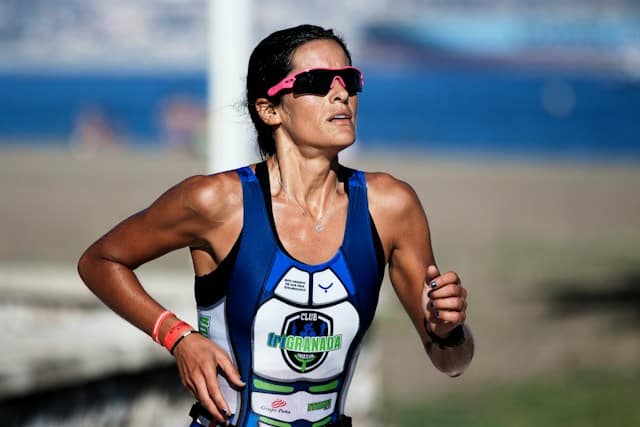Whether you’re a scholar athlete, an elite professional, or a weekend warrior, keeping your nutrition in check while on the road can be a daunting task. From time zone disruptions to limited food options to sleep deprivation, travel presents a host of obstacles to athletes striving to maintain their performance levels.
In this article, we’ll be exploring the various challenges athletes face while traveling, as well as the strategies they employ to overcome these obstacles and keep their nutrition in check. We’ll delve into topics such as the impact of travel on the circadian rhythm, the role of sleep in recovery, and the importance of dietary adjustments in peak performance.
Cela peut vous intéresser : What’s the Role of Analytics in Developing Winning Strategies in Team Sports?
The Impact of Travel on Athletes’ Circadian Rhythm
When you cross multiple time zones in a short span of time, your circadian rhythm – or internal body clock – can get thrown off. This can disrupt sleep patterns, leaving you feeling sluggish, disoriented, and jet-lagged. This, in turn, can take a toll on your performance.
Several studies, including some indexed on Google Scholar and PubMed, have investigated the effects of travel and circadian rhythm disruption on athletic performance.
A lire également : How Are International Sports Federations Working Towards Gender Equality?
For athletes, getting their internal body clocks back on track is a top priority. To do this, they might adjust their sleep-wake schedules to the new time zone a few days before departing. This can be done by gradually shifting bedtime and wake time, and by controlling light exposure.
Sleep: An Essential Component of Recovery and Performance
Sleep is a crucial component of every athlete’s recovery process. It aids in muscle repair, promotes growth hormone release, and consolidates memory – all of which are vital for athletic performance. But when you’re traveling, getting enough shut-eye can be a challenge.
Athletes may need to contend with less-than-ideal sleep environments, including unfamiliar hotel beds, noisy surroundings, or bright lights. They may also have to deal with demanding schedules or anxiety about upcoming competitions, both of which can interfere with sleep.
To cope, many athletes prioritize sleep hygiene while traveling. This can involve strategies such as sticking to a consistent sleep schedule, creating a calming pre-sleep routine, and ensuring a dark, quiet, and cool sleeping environment. They might also leverage tools like sleep tracking apps or wearable devices to monitor their sleep quality and duration.
Food Choices: Meeting Nutritional Needs on the Road
Finding suitable food options while traveling can be another significant challenge. With limited access to familiar foods or cooking facilities, athletes might struggle to meet their nutritional needs.
However, careful planning and strategic food choices can go a long way. For instance, athletes might pack portable, nutrient-dense snacks to have on hand during travel. These could include items like protein bars, dried fruit, or nuts. They might also scope out local grocery stores or restaurants ahead of time to identify potential meal options.
The role of dietary supplements also warrants mention. Some athletes might choose to bring along protein powders, vitamins, or other supplements to ensure they’re meeting their nutritional needs. However, it’s important to remember that supplements should not replace a balanced diet, but rather, complement it.
Training During Travel: Balancing Performance and Recovery
Even while on the road, athletes need to continue their training to maintain their performance levels. But with changing schedules, unfamiliar environments, and limited access to training facilities, this can be a challenge.
Many athletes opt for versatile and portable training tools, such as resistance bands or bodyweight exercises, that can be done anywhere. They might also modify their training plans to accommodate their travel schedules, focusing on maintaining fitness rather than pushing for new personal bests.
But perhaps most importantly, they’ll need to balance training with recovery. This means ensuring adequate sleep, nutrition, and hydration, as well as taking time to stretch, cool down, and relax the mind.
The Role of Support Teams in Athletes’ Travel Nutrition
Finally, it’s worth noting that athletes often don’t navigate these challenges alone. Many have support teams, including coaches, nutritionists, and sports psychologists, who help them plan and execute their travel nutrition strategies.
These professionals can provide guidance on meal planning, sleep strategies, and training adjustments. They can also help athletes manage the stress and anxiety that can often accompany travel, ensuring they’re mentally as well as physically prepared to perform at their best.
In the end, while travel can certainly pose challenges to athletes’ nutrition and performance, it’s by no means an insurmountable obstacle. With the right strategies and support, athletes can maintain their diet, sleep, and training routines on the road, ensuring they’re always ready to bring their A-game, no matter where they are.
Mental Health: The Psychological Challenges and Strategies for Athletes
Maintaining one’s mental health can be challenging for athletes while traveling. The disruptions of routines, unfamiliar environments, and the stress of competitions can take a toll on athletes’ mental well-being. According to articles indexed on Google Scholar and PubMed, travel fatigue and disruptions in sleep patterns can lead to increased anxiety and decreased mood stability in athletes, impacting their performance levels.
Many elite athletes work with sports psychologists to manage the psychological challenges that come with travel. These professionals might provide techniques for mitigating stress and anxiety, such as mindfulness exercises, relaxation techniques, and cognitive-behavioral strategies. For example, an athlete might be taught breathing exercises to help calm pre-competition nerves or visualization techniques to improve focus.
In addition, maintaining a regular routine can also provide a sense of normalcy for athletes on the road. Having a consistent schedule for meals, physical activity, and sleep can help mitigate the effects of travel fatigue and time zone shifts. Athletes may also benefit from regular contact with friends and family back home, which can provide emotional support and help them feel connected despite being away.
The Importance of Athlete Monitoring During Travel
Monitoring an athlete’s physical and mental state during travel is essential for maintaining performance levels. This can involve tracking sleep patterns, nutrition intake, and physical activity, as well as assessing mental health.
There are many tools available to support athlete monitoring, from wearables that track sleep and activity levels, to apps that help manage nutrition and hydration. Furthermore, many sports teams and elite athletes work with sports medicine professionals who use advanced technologies to monitor various metrics related to athletic performance.
This real-time data can be invaluable in making immediate adjustments to an athlete’s routine. For example, if an athlete’s sleep tracking data shows poor sleep quality, they might adjust their sleep hygiene practices or seek guidance from a sports psychologist. If their nutritional data indicates inadequate calorie intake, they could consult with a nutritionist to revise their meal plan.
Monitoring also allows for early identification of potential issues. For instance, a decrease in physical activity levels could indicate travel fatigue, while changes in mood or behavior might suggest mental health challenges. By keeping a close eye on these metrics, athletes and their support teams can proactively address these issues before they significantly impact performance.
Conclusion
Traveling poses specific challenges to athletes, including the disruption of the circadian rhythm, sleep deprivation, and maintaining a balanced diet. However, with proper planning, strategic adjustments, and the support of a dedicated team, these obstacles can be managed effectively.
Athletes need to prioritize their sleep hygiene, make tactical food choices, continue their training routines, and look after their mental health. The role of athlete monitoring also cannot be understated in maintaining an athlete’s performance levels while traveling. With the ability to track sleep, nutrition, physical activity, and mental health, athletes can stay on top of their game, no matter where they are.
In conclusion, while maintaining a balanced diet and performance level during travel can be challenging for athletes, it is not an insurmountable task. As this article, supported by indexed articles on Google Scholar and PubMed, illustrates, athletes can employ various strategies to effectively manage these challenges. The field of sports medicine continues to evolve, providing athletes with ever-more advanced tools and strategies for maintaining peak performance during travel. With good preparation and a strong support system, athletes can overcome travel fatigue, adjust to new time zones, and maintain their physical activity levels, ensuring they’re always ready to perform at their best.
















